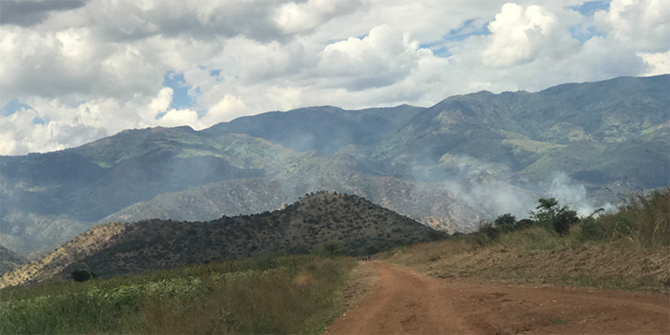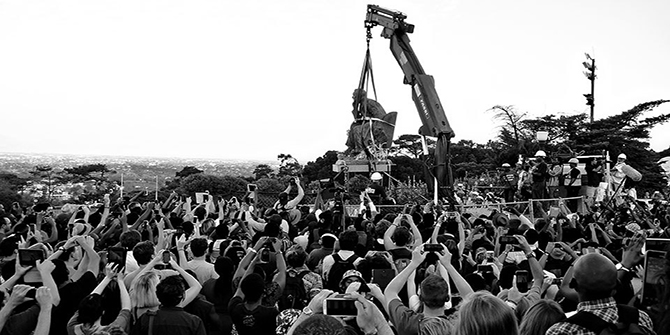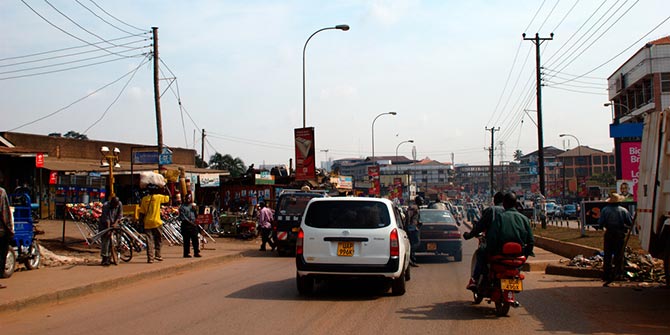Hana Sandhu says this book is a gripping account of the country’s radical history of political struggle.
As a reporter with 30 years of experience working in the region, Ernest Harsch’s Burkina Faso: A History of Power, Protest and Revolution is rich with detail of Burkinabé society and the complex relationships of power, patronage and social class. Harsch explores the long-standing struggle between populist revolutionaries (particularly students and teachers’ unions) and the reactionary forces of the Burkinabé elite. He argues that the constant political mobilisations and agitations since the 1915-16 revolt was the driving force behind the 2014 revolution and the eventual toppling of Blaise Compaoré’s dictatorship.
Despite the relatively short lived revolutionary experiment of Thomas Sankara (1983-87), protest is proudly upheld as a feature of the Burkinabé mode de vie and as integral to the national identity. Moreover, Harsch reveals how other international struggles have resonated strongly in Burkinabé political consciousness. The 2011 uprisings across the Middle East were a source of huge inspiration for Burkinabé activists and many slogans such as ‘Burkina will have its Egypt!’ were heard on the streets.
There have been multiple revolutionary transformations in Burkinabe society which Harsh traces back to early resistance against French imperialism in the late nineteenth century. Indeed, French forces were surprised to find themselves confronted with co-ordinated resistance amongst West African tribes. Harsch argues that early and concerted resistance to French colonialism led to the creation of a coercive and deeply divisive colonial administration with the ‘ad-hoc appointment’ of local chiefs and Mossi elites to positions of power. Implementation of indigénat legal statutes, which enforced labour and military service with the threat of fines and imprisonment for non-compliance, sowed further discontent.
Whilst organised civil disobedience and protest runs continuously through Burkina’s history, the violent reprisals and repression of the state is similarly a constant theme. Throughout Burkina’s history of protest, unarmed protesters have been met with live rounds of artillery, beginning with the French army’s devastation of a village in response to organising a tax boycott in 1933.
The courage of villagers, students, trade unionists and feminists continuing to articulate their political demands in the face of steadfast repression and state violence is startling, and perhaps why one interviewee refers to it as a quasi-heritage: ‘insurrection is rooted in the DNA of the Burkinabé people.’ Indeed, the dissemination of radical ideas across Burkinabe society extended even to the junior ranks of the army. Harsch notes how Sankara, as a junior officer, was radicalised reading Ho Chi Minh and Che Guevara as part of their counter-insurgency officer courses.

The long dictatorships of Maurice Yameogo and Colonel Lamizana saw the concentration and entrenchment of power to a tiny minority along with the banning of all opposition parties and removal of constitutional deadlines for presidential time-limits. The political legacy inherited by Thomas Sankara therefore posed significant challenges. His ambitious programme attempted to present a ‘clean-break’ with the old system of flagrant corruption and abuse. The ostentation of wealth was shirked by the revolutionary vanguard, the most notable example being Sankara’s choice of a Peugeot 205 for official business.
The five day war with Mali in 1985 proved a critical turning point in the revolutionary period, banishing for good the demand that the army take a lesser role in public office. Harsch argues that the Committees for the Defense of the Revolution (CRN) split strategy of persuasion and coercion along with the overwhelmingly militarist orientation proved its undoing. Sankara’s conciliatory posture and appeal for tolerance isolated him politically within the CRN and with the backing of France, he was assassinated in 1987.
Throughout Harsch’s account, the challenges of uprooting the old system despite huge popular pressure is a recurrent theme. General strikes, and other forms of civil defiance mobilised huge numbers paralysing the everyday functioning of the state in what became known as the tactic of ville morte. Harsch notes also how a regional urban youth and organisations such as Balai Citoyen consciously modelled themselves on Sankara. In the months following the departure of Compaoré, elections revealed the ingrained reality of the old system, the elite presidential guard attempted their own coup and politically centrist leaders adopted the populist language of the streets to advance their own political careers. Indeed, Harsch notes the deep uncertainty and vigilance of the time from activists who stated that ‘we’re not giving them any honeymoon.’ Through looking at Burkina history from a longue durée perspective, Harsch evinces how today’s activists were politically skilled and engaged to effectively challenge the elites’ stranglehold on power.
This is a history that shifts away from the personal narratives of powerful figures focusing instead upon the epochal shifts from the grassroots level and therefore has a broad appeal in terms of its readership. For those who enjoyed Jack Shenker’s Egypt: A Radical Story would find this book similarly riveting and informative. The strength of Harsch’s account is precisely his choice to document a history from below, revealing how radical political visions of society were developed and disseminated across society and generations, effectively recasting the history of Burkina Faso as one of an ongoing revolutionary struggle.
Burkina Faso: A History of Power, Protest and Revolution. Ernest Harsch. Zed Books. 2017.
Hana Sandhu is an MPhil candidate at the Centre for Cultural, Literary and Postcolonial Studies, SOAS. Her research interests include decolonial ethics, historiography and the politics of knowledge.
The views expressed in this post are those of the author and in no way reflect those of the Africa at LSE blog or the London School of Economics and Political Science.





